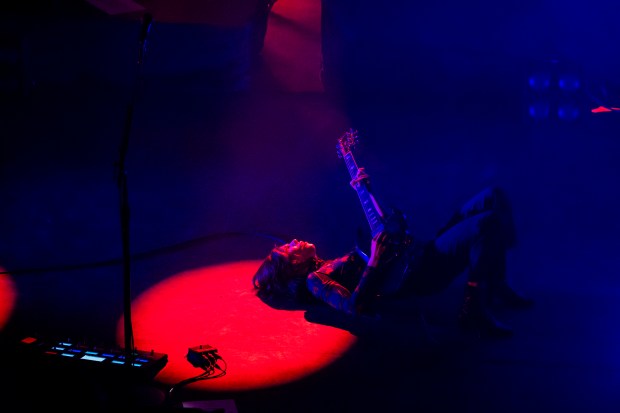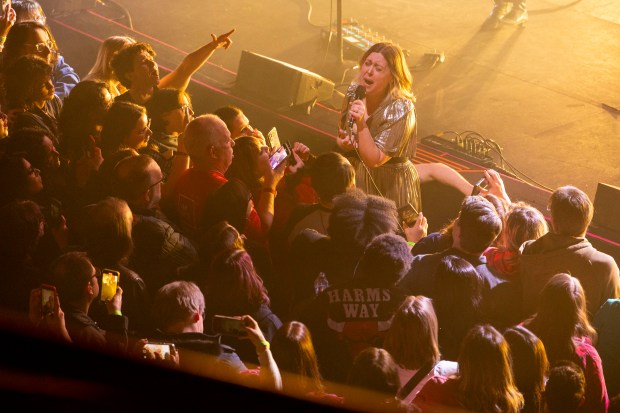Sleater-Kinney, the great Olympia, Washington, band that played Thursday night at the Riviera Theatre in Uptown, has been together exactly 30 years. This is worth noting because founding members Carrie Brownstein and Corin Tucker never mentioned it themselves during the show, and neither the tour nor the merchandise were splashed with “30th Anniversary.” It’s worth noting because, after decades of anthemic shredding that flirts lovingly with classic rock bombast, this absence of self-aggrandizement — or perhaps, punk nonchalance — has left Sleater-Kinney one of the last great rock acts.
A bunch of years ago, I saw them play Springsteen’s “Promised Land,” and then Danzig’s “Mother,” and that’s as encompassing a rock lifestyle statement as you can get, equal parts earnest and dramatic and defiant and hopeful. And never a pose. When Springsteen sang “Blow away the dreams that tear you apart/ Blow away the dreams that break your heart,” it wasn’t the inspirational rhetoric it reads like, but genuine liberation, and when Tucker waded into the crowd at the end of the night and belted “Untidy Creature,” a new song obliquely mourning the overturning of Roe v. Wade, it wasn’t acting. She sang: “You built a cage but your measurement’s wrong/ ‘Cause I’ll find a way and” — eyes squeezed, her anger taking control — “I’ll PICK YOUR LOCK!”
You would not doubt her.
Sleater-Kinney was always one of those bands that felt like a way of being, dopey as that sounds. Formally, they were labeled punk. And the bread crumbs were obviously there; they sprung out of the riot grrrl movement in the Pacific Northwest in the early 1990s, though were more musically ambitious and stylistically omnivorous than most. Even decades later, like fine indie rock wine, you still taste notes of Gang of Four and Sonic Youth. Brownstein still sings with an angular snap reminiscent of late ‘70s new wave art punk Lene Lovich. But I have always thought of Sleater-Kinney as more of a soul band, in a pretty literal sense. Their opening, “Hell,” from their 11th album, “Little Rope,” carried a gnarled ambient menace and Old Testament matter-of-factness, with moaned lines like “Hell is just a place that/ We can’t seem to live without.”
As with any soul act, this feeling of dread in the world always winds its way toward transcendence. That part is still nicely embodied by Brownstein, who stood rigid at her microphone, shimmying an inch to the right and left in heeled boots. She vibrated with every lyric traded off with Tucker, looking like an overheating robot, only to burst into Pete Townshend windmills and kicks and leaps and crouches. Tucker’s voice is often called a rock-star banshee wail, and that’s not wrong, but it overlooks her control. On the older Sleater-Kinney tunes they played — “One More Hour,” “Dig Me Out,” “Good Things” — that voice became a reminder of how much soul has been their secret sauce.
Soul music is urgent music.
There’s no pausing to bask in applause. Tucker and Brownstein plunge ahead, spiky chord after spiky chord, often drawing from a great old classic-rock playbook that chunks up a fat riff only to raise the stakes a second later with a louder guitar. It’s a great trick that rarely loses power, interlocking Brownstein and Tucker magically. On a bouncy song like “Get Up,” they pull together with touching exhilaration, Tucker shouting “Like stars, so small/ Like us, when we fall…” then both: “Get up! Get up!” Again, the punk is evident, the soul is there, but also, a lifetime of FM radio. The image of singing when no one is around, windows down, belting Heart or Black Sabbath, loud and clear — that’s Tucker’s voice, a Gen X siren of theatrical peaks that shivers bones. Sabbath, incidentally, can be found in the DNA of their sludge, and Heart is right there in Sleater-Kinney’s knack for pushing even the most plaintive of songs to a place where it soars.
They sound huge, and now, with a handful of touring musicians backing up what was long a trio — drummer Janet Weiss left in 2019 — they are somewhat larger on stage.


But Tucker and Brownstein, who form one of the most distinctive frontlines in rock, are the core, and watching them again, for the fifth or sixth time, I wondered why this band was never bigger. I also got a feeling that questions like that no longer concern them.
They played a lot of new songs, which were thoughtful and unfussy, many about grief, written after Brownstein’s mother and stepfather were killed in a car accident in 2022. They’ve said in interviews that when the police called, Tucker was the first reached because she was listed as Brownstein’s primary emergency contact.
I mention that because there’s a warmth and reality on stage at their shows rarely seen at concerts, a real friendship you can’t fake. It comes across. Tucker leans in occasionally and rests her head against Brownstein’s back, and that feeling extends outward. Near the end of the set, they played the peppy “A New Wave,” from a few albums back, and it’s like a hand being extended beyond the stage into the audience: “No one here is taking notice/ No outline will ever hold us/ It’s not a new wave, it’s just you and me.”
cborrelli@chicagotribune.com




